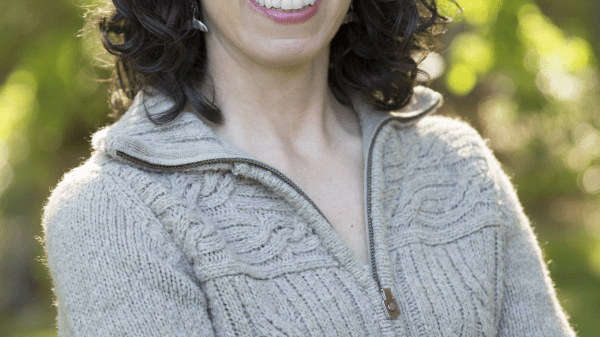Affiliate Highlight: Rhode Island Environmental Education Association

NAAEE sat down with the Rhode Island Environmental Education Association's Executive Director, Jeanine Silversmith, to discuss the important role advocacy plays in securing the future of environmental education in the state of Rhode Island. Part of that work includes advocating for the successful passage of a climate literacy bill that could help transform environmental education across the state.
NAAEE: Introduce yourself and the Rhode Island Environmental Education Association. Who are you, what do you do, and what's one thing that EE advocates should know about your work within the environmental education field?
Jeanine Silversmith, she/her, RIEEA: My name is Jeanine Silversmith. I'm the Executive Director of the Rhode Island Environmental Education Association, otherwise known as RIEEA. Our mission is to promote and support environmental education in the state of Rhode Island. And in terms of what EE advocates should know, the most important thing I can say, and I think other people have quoted me on this, is that if we weren't advocating for environmental education on a state level, I'm not sure who would be. So, I know that there are individuals, but in terms of an organization pulling people together in a movement, no one was really doing that on the state level here in Rhode Island.
NAAEE: What are some of your advocacy and policy priorities over the next couple of years?
Jeanine Silversmith: We are very much focused on advocating for environmental education. There was a time when different groups and legislators were asking us to support lots of different bills at the state house that were environmental in nature and they were worthy but we've really focused on environmental education policy. And so our main priority this session that's going to be starting in January is to get the climate literacy bill passed. This has been introduced in the Rhode Island state house for a number of years now. We came farther last year or last session than ever before, so I'm feeling really hopeful for this year. It would basically integrate environmental education and specifically climate education into our K–12 system, and it does this in a number of ways, not the least of which is professional development for teachers, because that's something we've learned teachers really want. So that's really our main priority. I do pay attention to other bills that are in our state house, and if there's environmental education somehow in them or related to them, then I will send in written testimony or testify in person on behalf of those bills. So it's really about promoting sound environmental education policy on the state level and then looking for ways that Rhode Island can help support any federal legislation. I know that there's been a lot of good ones that have been introduced the last couple of years [such as] the climate change education bill on the federal level and the No Child Left Inside bill a number of years ago, which this year is being reintroduced at the federal level.
NAAEE: How does RIEEA approach advocacy as an organization? If you could condense it to a philosophy, what would it be?
Jeanine Silversmith: So that's a great question. That's a hard question. I think if I had to condense it to a philosophy, it's—like I said before—not to get pulled away from environmental education. Maybe there's a bill in the house that's related to water quality and that's really important, but if there's no educational piece, it's not really RIEEA's place to weigh in on whether or not that bill should go forward. At the same time, environmental education doesn't look one way. I mean there are so many different ways to do environmental education! Is it taking a group of third graders on a walk in the woods behind their school and looking at birds and trees and mushrooms? Yeah, that's environmental education; that's really important. There's also teaching tenants how to advocate for fair prices in their energy bills; that's environmental education, too. There are Indigenous ways of knowing and learning that are being elevated now after being denied and ignored for so long and that's a type of environmental education. So, even though we have a broad definition of environmental education, I think our number one philosophy is to stay true to education being a part of this important work, and making sure it's in whatever kind of bills that it should be. Another important piece of our philosophy is relationship building. You know it starts with talking to people who are in elected seats or positions of power and bringing environmental education to their attention. I believe that's just as important. You can't advocate for a bill and have much weight, at least in this state, without having made some connections to the folks who are in the statehouse. Building personal relationships between elected officials and the rest of the Rhode Island community is really important.
NAAEE: The state affiliates are a close-knit community. You learn from one another, support one another. What's one piece of advice you would offer to the other affiliate leaders who may want to get more active in advocacy work or create those communities in their state?
Jeanine Silversmith: The first thing I would say is five years ago, if you told me that I was going to be testifying at the state house or having conversations with the governor's office or all these things I do, I would have probably laughed because it is not in my wheelhouse and it's not in my training and it's not where I'm comfortable. And it's just not something I ever wanted to do. But I realized that if RIEEA isn't advocating for environmental education in our own state, then maybe it's not happening. So I just took a step in that direction and I am constantly learning. I'm still learning every day after five years of doing this work. And I would say to anybody in the affiliate network, embrace that it's a learning process and know that there's so much more benefit to this work than just the really important piece of getting bills passed or getting good policies in place. When state legislators retweet something that we post, you know we're reaching a much larger percentage of the population in Rhode Island than we can ever do on our own. Know that this is part of what affiliates need to do on the state level, and there is a lot of support from NAAEE, the affiliate network, in your own states, and so many others in this fight.
NAAEE: Whether it's policy or advocacy or professional development, we do a lot to reach those goals in the field, and it sometimes takes a long time to see the results of them. How do you overcome those challenges, and can you provide some lessons that you've learned to keep your spirits up and momentum going forward?
Jeanine Silversmith: It's a marathon, not a sprint. Year after year you're building relationships, building momentum, and so when things don't happen right away remember that it's part of the process. If you keep doing this work, what comes out of it may be better than if you started and got something passed right away. If you're working to get a bill passed and it happens right away, that's fantastic, that's great. And if it doesn't, it means that there are enough people pushing back on it that you can open yourself up to more connections, more relationships, and learning about what your state is ready for. Maybe you can change what you’re working on for the better. The pushback is not always a good thing. Sometimes people are pushing back because they don't want change or they don't believe in climate change or whatever it is, but at least for me, that just inspires me more. Because then there are more and more people that I need to reach. This is a slow process. So I just embrace that and know that I'm doing the right thing.
NAAEE: You were saying there are different communities of people that you still can reach out to, maybe new ways to think about reaching out to them. Can you explain that?
Jeanine Silversmith: One such community I would have never thought of is the faith-based community in Rhode Island. It's very passionate about and fired up about climate change, climate change education, environmental education, sustainability in their own buildings, and also as lessons from their own scripture. And it's not just churches. It's synagogues. It's mosques. It's the Indigenous community. There is a lot of passion and interest in supporting this work, and I really just came to know that in the past year. It's a community that I personally never would have thought to connect with, but I’m so grateful that they found me! And I think we're stronger because of that.
NAAEE: Let's talk about how you've been working to survey teachers across the state to provide some feedback on barriers to environmental education. Can you speak a little about your strategy for that, and what you've learned so far.
Jeanine Silversmith: In 2018 we did a survey of K–12 teachers and administrators across the state. We had over 700 people respond, which is fantastic for a state like Rhode Island. One of the things we learned is that teachers want professional development to engage the K–12 community in environmental education in an age-appropriate way. Also, buy-in from their administrators and community is key. So we then have shifted our approach to our advocacy work based on what the teachers have told us. The professional development piece is a large part of this climate literacy bill that we are hoping to pass this coming session. In this bill, we're not creating a new course or another graduation requirement that would be an add-on to their already very, very full days. We just wanted to give teachers the tools, the resources, the materials, the activities and lesson plans, and physical equipment to do environmental education in their classrooms, and we learned that directly from the teachers. So I think it was really great timing to learn that as we helped craft and promote this climate literacy bill.
NAAEE: What are three tips you can offer to those of us who might be searching for ways to get our foot in the door to help with environmental advocacy work?
Jeanine Silversmith: When there's an opportunity to either submit written testimony or show up either in person or on the phone at the state house to advocate for a certain bill—do it! Also, make yourself available to teachers and students to be involved in that process. It’s pretty simple: this is the bill, what do you guys want to talk about, and just help them think about how they want to testify, what they want to say in their testimony, and coach them through some public speaking. You know when you're in that situation, it's a little different than other forms of speaking, because there are very rigid rules about who can talk when and for how long and so on. Also, don’t forget that there are many people in your state, in your community that can support you as you get involved in advocacy work and you just need to keep looking until you find them. That's what I did. You know I just kept saying to folks, well you're at the state house sometimes, can I ask you this question, can we have a meeting, can you help me with this? I didn't even know what my state house looked like on the inside! Before I started doing this work, I had never really been there. I didn't know that you had to walk in and sign up on a certain literal piece of paper to be able to testify; all those things I just learned from asking folks around me and everyone's really willing to help. At the very least, your state affiliate can connect you to the people that are advocating, no matter what they're advocating for. They might not be advocating for environmental education, but if they're at the state house, you could look to them for some tips on how to start that work. I would also say that NAAEE is a huge support. I reach out to Sarah Bodor and Brock Adler regularly. Should I work on this, what should I do about that, I don't know what to say about this and so on. Jim Elder at the Campaign for Climate Literacy has been working very closely with Rhode Island, helping me understand how these things work. Just having another person to brainstorm with about how we approach a certain legislator, which tactic do we want to take. There are plenty of people out there and, like I said, they don't necessarily have to be advocating for environmental education. Some of the bigger environmental groups have lobbyists on staff. They know what they're doing, so connect with them.
NAAEE: How can EE advocates in Rhode Island get involved with this work?
Jeanine Silversmith: We have a Google group and we post action alerts there. If you're a member of RIEEA you can come to an advocacy committee meeting. We have a few per year. It's not that heavy of a lift to be on that committee. The sessions are only six months long in Rhode Island so we just have a couple of meetings. There will be a chance to testify, a postcard writing campaign, an email campaign, and possibly phone banking this coming spring for the climate literacy bill, so it's just a matter of connecting with me and getting on the right email lists and tuning in to certain action alerts when they come up. Another thing is to connect with a group like Common Cause, a national organization whose whole mission is to educate people on civic engagement. On the RI chapter website, they have a map of the state house and they point out which committees are in which rooms, at what time, and what day of the week. So if you can look into a group like that, you can learn all those basic techniques for becoming civically engaged.
NAAEE: This edition of eeADVOCATE is centered around hope. What or who gives you hope as you and RIEEA continue to advocate for accessible and intentional environmental education?
Jeanine Silversmith: The people that give me hope every day are the people who are marginalized in some way or in many ways and still keep showing up to advocate for their rights for the environment for their health. I mean, I will be perfectly clear, as a white woman of a certain level of privilege, I don't need to do this work to know that I'm going to have a relatively good, healthy life. So, when I see people whose very survival depends on them advocating for themselves, and I can't imagine how tired they are, I get all the energy I need. And the same thing with young people who, you know, can't vote and are powerless in a lot of ways, they keep showing up for their own survival into adulthood and for other folks' lives. I have no excuse. I can't be tired. I can't give up hope because, even if nothing changes, I can't do anything but this work that's in front of me. So yeah, that's what gives me hope.
Thank you, Jeanine, for sitting down with us to share your thoughts and insights on advocacy in Rhode Island and on a national level!
Resources
- Rhode Island Association for Environmental Education Google Group: http://rieea.org/join-the-listserv
- Rhode Island Climate Literacy Bill Advocacy: http://rieea.org/2022-climate-literacy-act/
- Not in Rhode Island? Find and connect with your state affiliate here: https://naaee.org/our-partners/affiliates
Thumbnail Image: Adam Sternin 2016


